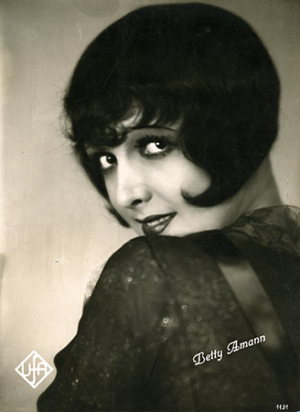Gallery
All Pictures (29)Biography
Betty Amann was born as Philippine Amann on March 10, 1905, in Pirmasens, Germany. Together with her German-American parents, she moved to the United States at an early age. By her own account, she studied painting at the National Academy of Fine Arts in New York before she was discovered for the stage and won small parts at the May Palace Theater.
She started her screen career as Bee Amann in the 1926 romantic movie "The Kick-Off", directed by Wesley Ruggles. Two years later, she starred as a farmer's daughter in Robert de Lacey's western "The Trail of the Horse Thieves".
In 1928, she returned to Germany, where she met Erich Pommer and Joe May who picked her for the female lead in "Asphalt". It was Pommer who gave her the pseudonym Betty. In 1930, she told the "Filmwoche" magazine her real name was Philippine. In "Asphalt", Betty Amann played a jewellery thief who is caught in the act by a young and upright policeman (Gustav Fröhlich). After she manages to seduce him, he lets her go. The policeman, however, falls in love with her and gets arrested for killing her lover. To rescue him, she gives up her own freedom. After this movie, Amann was frequently cast as the femme fatale: Her typical role was that of an immoral and alluring woman who seduces and corrupts men. She played sirens and losers, portraying power and powerlessness.
Her next movie, "Der Sträfling aus Stambul", led the newspaper "Vossische Zeitung" (September 1, 1929) to claim that "she was not at all born to portray unexperienced, middle-class girls". In "Der weiße Teufel" ("The White Devil"), she played a dancer named Saira. The Polish production "Niebezpieczny Romans" (1930) was her last silent movie.
That same year, Betty Amann also made her first appearance in a talkie. In Istvan Szekely's "Die große Sehnsucht" ("The Great Desire") she played herself. Her following speaking parts included a millionaire's daughter in "O alte Burschenherrlichkeit" ("Oh Those Glorious Old Student Days"), directed by Rolf Randolf, as well as an alluring stranger who turns out to be a murderess in Carl Froelich's crime film "Hans in allen Gassen" starring Hans Albers.
Since 1931, she also starred in British films. In Alfred Hitchcock's "Rich and Strange" she took on the role of a trickster, and back in Germany she shot "Der grosse Bluff" ("The Big Bluff"), "Die kleine Schwindlerin", and "Schleppzug M 17" ("Tugboat M 17"). In the latter movie, directed by Heinrich George and Werner Hochbaum, she starred as a prostitute and thief who seduces a family man. In 1933, after the takeover of power by the National Socialists, she had to emigrate and went to Great Britain.
By 1938, Betty Amann was married to the lawyer David B. Stillman and took up permanent residence in the United States, where she shot the western "In Old Mexico". One year later, she could be seen in "Nancy Drew…Reporter", a movie which was part of the Nancy Drew series starring Bonita Granville. In 1943, she played a harbor prostitute in Edgar G. Ulmer's treasure hunter movie "Isle of Forgotten Sins", which remained her last film.
At the 1987 German Film Awards, Betty Amann received the "Filmband in Gold" for her "long-time and outstanding contribution to German film". She died on August 3, 1990.
In 1987, Uta Berg-Ganschow wrote about her: "Her eyes are the mirror of other people's wishes. That's what makes them attractive – they're brazen. These eyes do not reveal anything, they merely attract looks. Men are quick to jump upon these wishes: the calculated tear, the teetering bow above her bottom, her curls. All this is banished into the world of the demimonde. But why would the viewers care into what kind of social figure their fantasy is transformed? […] Instead of becoming the picture of fallen morality, Betty Amann becomes the picture of self-assured transgression."
